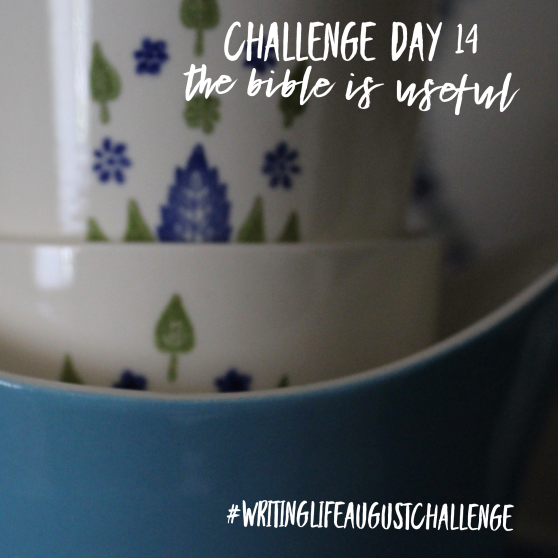When I sat down to write this blog, I considered approaching it by discussing the differences between my husband and I when it comes to being a student. I was always a good student—I enjoyed school, got good grades for the most part (my math and science teachers may disagree on that one), and just kept going and going and going through to the PhD level. Honestly, much of my education was easy for me until the graduate level, when I had to put in some honest, hard work. I was—and still am, in many ways—a good learner.
But my husband? He claims to never have been a good student. Maybe not bad, but perhaps the word he would choose (if he used words like this) would be mediocre. Now, as a new student of the Bible—new, meaning that the past few years have been the only time in his life that he has actually tried to read it and learn from it—he struggles. He struggles because he is unfamiliar with the material and finds some concepts difficult to grasp; he also struggles because he has a notoriously bad memory. (I’ll admit to adding the word notoriously in there.)
That’s how I was going to start the blog—and how, I suppose, I did start it. After starting this way, I was going to neatly segue into today’s topic, how we can learn from the Bible. I even prepared a challenge photo to go with it:

And then I realized I was reading today’s verse all wrong.
Today’s Inspiration. The inspiration for today’s challenge is, as it has been for a few days, 2 Timothy 3:16:
All Scripture is God-breathed and is useful for teaching, rebuking, correcting and training in righteousness. (NIV)
The focus today is All Scripture is … useful for teaching.
Do you see my mistake?
All Scripture is useful for teaching. Teaching, not learning, as I was thinking of it. Of course, if the Bible (and I’m including the New Testament in here, which Paul didn’t have—but was writing a large part of—when he used the word Scripture) is useful for teaching, then it is also useful for learning from. But when Paul wrote this, he was writing to Timothy who was in a place of authority in the ministry. He was leading the ministry, at the same time that Paul was teaching him how to minister.
There is a big difference between being the teacher and the student. I can say this from years of experience, because I’ve been both. In fact, when I started teaching I was simultaneously learning how to teach and learning material I wasn’t teaching at all. That’s the paradox of a graduate teaching assistant—in charge of my own classes, learning what tools to use to teach as I was teaching, but also taking my own classes in subjects far beyond my students’ level of learning. That’s a bit how I imagine Timothy here: He’s done taking his own classes and set loose on his own, a bit like the dissertation-writing time for a PhD student. He’s already leading and teaching, but he also still needs advice from his advisor, Paul. So they write back and forth, and what we have here is Paul giving Timothy some advice.
And what is he saying? He’s saying All Scripture is … useful for teaching. You have the textbook to teach from, Timothy. When you build your curricula, use that. Any of it. All of it. Because all Scripture is useful for teaching.

But where does that bring us? I suppose that depends on where you already are.
Today’s Challenge. The thing about teaching is that, ideally, the teacher should know the subject well before attempting to teach it. When Paul told Timothy that all Scripture was useful for teaching, he knew that Timothy knew his Scripture. He had been brought up in the faith and had taken it as his own (2 Timothy 1:5).
There was something going in in Timothy’s ministry, too—he was dealing with a bunch of people who were teaching things that were “off” from what the Scripture or what Jesus had taught (which lined up with, you guessed it, Scripture). So Paul was telling him that Scripture was the tool he could always rely on for teaching—all of it.
This brings us to the “where you are” question, and to today’s challenge. First, prayerfully examine where you are in your walk with the Lord. Are you new to your faith, still learning? Have you believed in Jesus as your Savior for a long time, but still don’t know your Bible well? Do you know the Bible in and out, love what it says, and try to live it out? Somewhere in between? Does it depend on the day?
Next, try reading 2 Timothy 3:10-17 (or even more of the chapter/book). Get a wider sense of what Paul was telling Timothy. And then consider: Are you to the point of, or in a position in which you are teaching others of your faith? About God’s redeeming love, Jesus’ death and resurrection, about godly living—any of it? Or would you need to learn more yourself before attempting to teach? In both situations, the answer is God’s word: consider God’s word, all of it, the primary teaching material. And when you sit under someone else’s teaching (because all of us are still learners), find someone who teaches God’s word to do it.
Today’s Participation. Are you a teacher? A learner? Both? Either face to face or online, share with someone what you learned about yourself and the Bible in today’s challenge.



